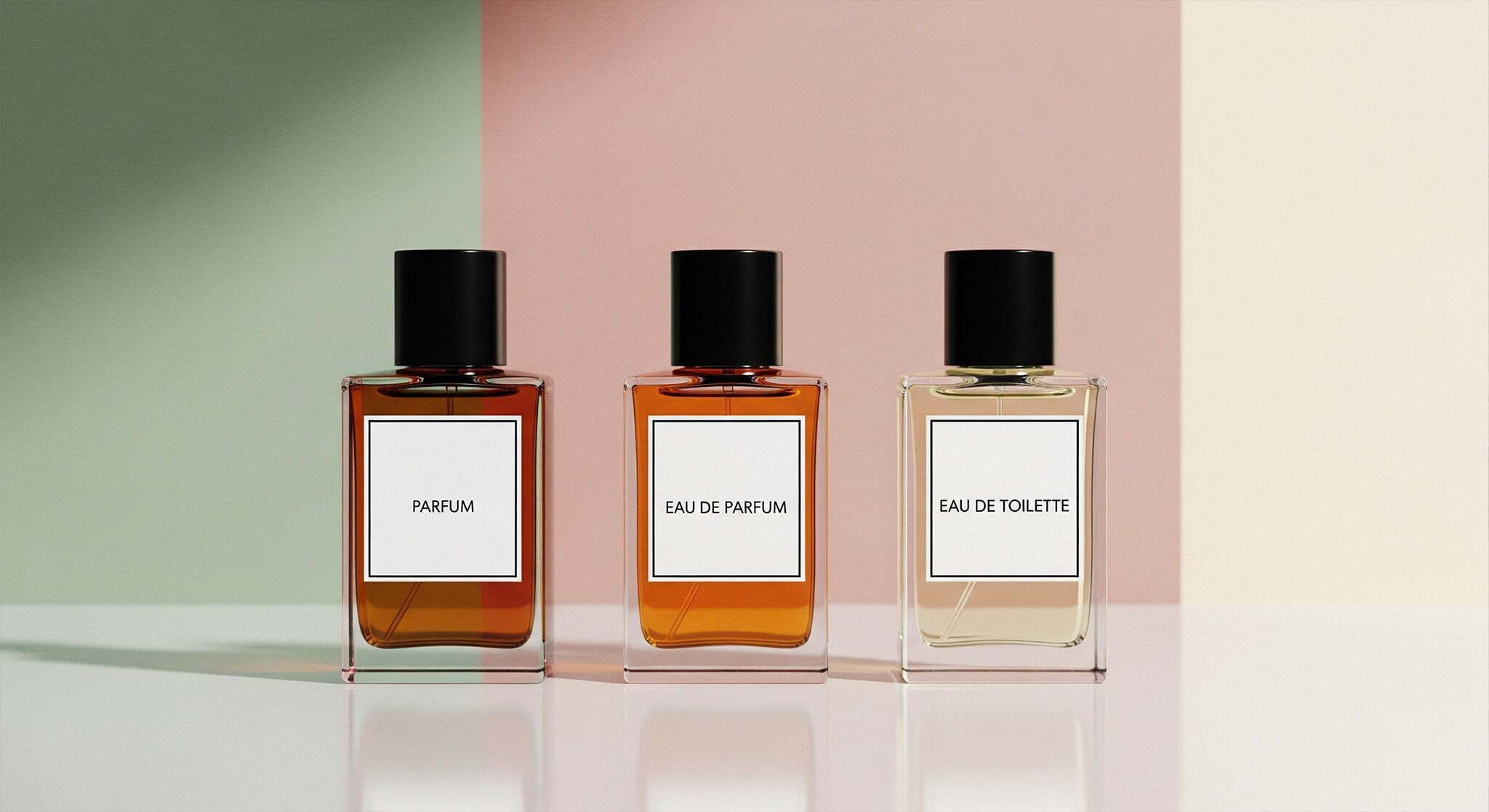Perfume Concentrations Explained: Parfum vs EDP vs EDT
Table of contents
Decoding the Label: What Do EDP, EDT, and Parfum Really Mean?
You’ve finally found a fragrance you love. You’ve tested it, lived with it, and are ready to commit. But as you reach for the box, you’re faced with a choice: a sleek bottle labeled “Eau de Toilette” and another, often smaller and more expensive one, labeled “Eau de Parfum.” They’re the same scent, but what’s the real difference?
These acronyms aren’t just marketing jargon; they are the technical language of the perfume world, indicating the concentration of pure fragrance oil within the formula. Understanding them is the key to buying the right scent with the perfect strength and longevity for your needs, ensuring you never waste money on the wrong formulation again.
The Simple Science: Perfume Oil vs. Alcohol
Every fragrance you buy is a blend of two primary components: the aromatic compound (the blend of pure perfume oils that creates the scent) and a carrier, which is usually a specialized perfumer’s alcohol. The alcohol serves a crucial purpose: it helps to project the scent from your skin, carries the different notes, and preserves the delicate oils. The ratio of pure perfume oil to alcohol is what defines the fragrance’s concentration, its longevity, and its character.
A Clear Breakdown of the Most Common Concentrations
Here’s a clear guide to the fragrance hierarchy, from the lightest spritz to the most potent essence.
Eau de Cologne (EDC)
- Concentration: 2-4% perfume oil.
- Longevity: Light and fleeting, typically lasts for about 2 hours.
- Best For: A refreshing, invigorating splash of scent. An EDC is perfect for a quick pick-me-up after a shower or for very hot climates where a heavy scent would be overwhelming.
Eau de Toilette (EDT)
- Concentration: 5-15% perfume oil.
- Longevity: A moderate 3-5 hours.
- Best For: This is the undisputed champion of daily wear. It’s ideal for the office or casual daytime activities where you want a pleasant but not overpowering presence. EDTs often feel brighter and fresher, emphasizing the sparkling top notes of a fragrance.
Eau de Parfum (EDP)
- Concentration: 15-20% perfume oil.
- Longevity: A long-lasting 5-8 hours.
- Best For: When you want your fragrance to last all day or transition into the evening. EDPs are generally richer and deeper, as the higher oil concentration allows the heart notes of the fragrance to be more prominent. This is the perfect choice for date nights, special events, and cooler weather.
Parfum / Extrait de Parfum
- Concentration: The highest concentration, typically 20-30% perfume oil, but can be as high as 40%.
- Longevity: Exceptionally long-lasting, often 8+ hours and can linger on the skin for a full day.
- Best For: The ultimate luxury experience. Because of the high oil content and lower alcohol content, Parfums are often more intimate, wearing closer to the skin with less projection (sillage) but incredible tenacity. A single dab on the pulse points is often enough.
EDP vs. EDT: Which One Should You Buy?
For most fragrances, this is the main choice you’ll face. Here’s how to decide.
Choose EDT If…
You prefer a lighter, fresher, or more subtle scent. It’s your perfect companion for daytime, professional settings, or hot summer months when a heavy fragrance can feel suffocating.
Choose EDP If…
You prioritize longevity and want your fragrance to make more of a statement and last through the evening. It’s ideal for cooler weather and special occasions where you want a richer, more complex scent experience.
Important Note: The Scent Can Differ!
Be aware that an EDP and EDT of the same name might not smell identical. Perfumers often slightly alter the formula between concentrations to best express the fragrance’s character. For example, an EDT might have more citrusy top notes to feel brighter, while the EDP version might have amplified floral or woody heart notes to feel richer.
Perfume Concentration FAQ
Is Parfum always “better” than an EDT?
Not necessarily. “Better” is entirely subjective. A light, fresh EDT is far more appropriate (and therefore “better”) for a summer picnic than a heavy Parfum. The best concentration is the one that suits your purpose, preference, and the occasion.
Why is Parfum so much more expensive?
You’re paying for the raw materials. The pure perfume oils are by far the most expensive components of any fragrance. A higher concentration means a significantly higher cost to produce.
Does a higher concentration mean the scent is “louder” or projects more?
Not always. An EDP often has strong projection (also known as “sillage”). However, a Parfum, due to its lower alcohol content, can be less diffusive and wear closer to the skin. It’s more of an intimate, long-lasting scent for you and those close to you, rather than a loud announcement to a room.
Do you prefer EDP or EDT for your daily scent? Share your favorite concentration in the comments!
